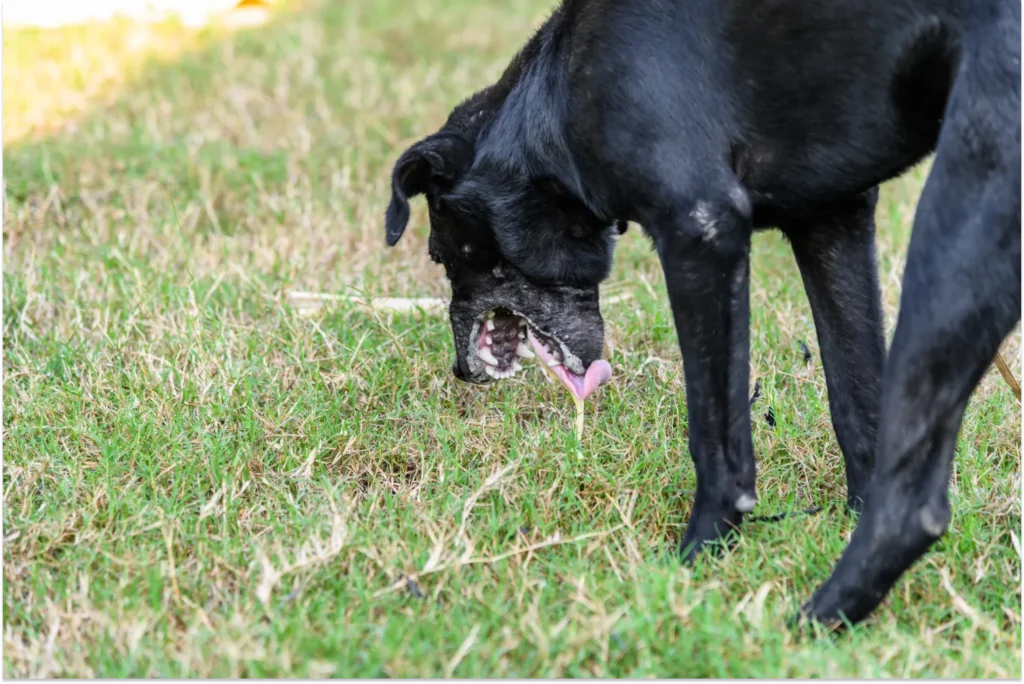Uncovering the Mystery: Why Does My Dog Throw Up Phlegm in the Morning?
As pet owners, it can be concerning and distressing to witness our beloved furry friends experiencing health issues. One common problem that dog owners may encounter is their dog throwing up phlegm in the morning. This peculiar behavior can leave us puzzled and worried about our dog’s well-being.
In order to address this issue effectively, it is important to understand the possible causes behind this behavior. Dogs, just like humans, can produce phlegm as a result of various factors. Phlegm is a thick, sticky substance that is produced by the respiratory system to help trap and remove foreign particles, irritants, or excess mucus. When a dog vomits phlegm, it is usually a sign that something is not quite right.
There are several potential reasons why a dog may throw up phlegm in the morning. One common cause is the presence of an underlying respiratory infection. Dogs can develop respiratory infections, such as bronchitis or kennel cough, which can lead to excessive production of phlegm. Additionally, allergies, sinusitis, or even a common cold can also trigger the production of phlegm in dogs.
Another possible cause for dogs throwing up phlegm in the morning is related to their diet and eating habits. Dogs that eat too quickly or overeat may experience regurgitation of food and phlegm in the morning. This can be particularly common in breeds with deep chests, such as Great Danes or German Shepherds, as they are more prone to a condition called gastric dilation-volvulus (GDV) or bloat, which can cause vomiting of phlegm.
Furthermore, dogs may also throw up phlegm as a result of certain medications or treatments they are undergoing. Some medications can cause irritation in the stomach or respiratory system, leading to increased production of phlegm. It is important to consult with a veterinarian if your dog is on any medications to rule out any adverse effects.

Why Does My Dog Throw Up Phlegm in the Morning
Understanding the reasons behind your dog’s morning phlegm can help you take appropriate measures to address the issue. In the following sections, we will delve deeper into the main causes and provide practical recommendations to help alleviate this problem and ensure your dog’s overall well-being.
Understanding the Causes of Morning Phlegm in Dogs
When it comes to understanding why your dog throws up phlegm in the morning, it is essential to consider the various factors that can contribute to this behavior. By identifying the underlying cause, you can take appropriate steps to address the issue and ensure your dog’s health and well-being.
Respiratory Infections
One of the most common reasons why dogs may vomit phlegm in the morning is the presence of a respiratory infection. Just like humans, dogs can develop infections such as bronchitis or kennel cough, which can lead to excessive production of phlegm. These infections can cause inflammation and irritation in the respiratory tract, resulting in coughing and the expulsion of phlegm.
If you suspect that your dog has a respiratory infection, it is crucial to consult with a veterinarian. They can perform a thorough examination and recommend appropriate treatment, which may include antibiotics, cough suppressants, or other medications to alleviate the symptoms and help your dog recover.
Allergies and Sinusitis
Allergies and sinusitis can also contribute to the production of phlegm in dogs. Just like humans, dogs can be allergic to certain substances in their environment, such as pollen, dust mites, or certain foods. When exposed to allergens, dogs may experience nasal congestion, sneezing, and an increase in mucus production.
In addition to allergies, dogs can also develop sinusitis, which is the inflammation of the sinuses. This condition can cause nasal discharge and post-nasal drip, leading to the regurgitation of phlegm in the morning. If you suspect that your dog has allergies or sinusitis, it is important to consult with a veterinarian for proper diagnosis and treatment options.
Diet and Eating Habits
The way your dog eats and their diet can also play a role in their morning phlegm. Dogs that eat too quickly or overeat may experience regurgitation of food and phlegm in the morning. This can be particularly common in breeds with deep chests, as they are more prone to a condition called gastric dilation-volvulus (GDV) or bloat.
To prevent this, consider feeding your dog smaller, more frequent meals throughout the day rather than one large meal. Slow feeder bowls or puzzle feeders can also help slow down their eating pace. Additionally, avoid feeding your dog immediately before or after exercise, as this can increase the risk of bloat.

Why Does My Dog Throw Up Phlegm in the Morning
Medications and Treatments
If your dog is on any medications or undergoing treatments, it is important to consider the potential side effects that may contribute to the production of phlegm. Some medications can irritate the stomach or respiratory system, leading to increased mucus production and vomiting of phlegm.
If you notice that your dog started throwing up phlegm after starting a new medication or treatment, consult with your veterinarian. They can assess if the medication is causing the issue and may recommend alternative options or adjustments to the dosage.
Practical Recommendations to Address Morning Phlegm in Dogs
1. Consult with a Veterinarian
If you’re wondering, “Why Does My Dog Throw Up Phlegm in the Morning,” it is crucial to consult with a veterinarian. They can perform a thorough examination to determine the underlying cause and provide appropriate treatment options. A professional diagnosis will help you address the issue effectively and ensure your dog’s well-being.
If you’re concerned about, “Why Does My Dog Throw Up Phlegm in the Morning,” it’s essential not to delay seeking veterinary advice. Ignoring this symptom could lead to further complications or discomfort for your pet. By addressing the issue promptly and seeking professional guidance on, “Why Does My Dog Throw Up Phlegm in the Morning,” you can ensure that your dog receives the care and treatment they need to maintain their health and well-being.
2. Treat Respiratory Infections
If a respiratory infection is the culprit behind your dog’s morning phlegm, a question like “Why Does My Dog Throw Up Phlegm in the Morning?” becomes particularly relevant. Follow your veterinarian’s advice regarding treatment when you’re trying to understand “Why Does My Dog Throw Up Phlegm in the Morning?” They may prescribe antibiotics, cough suppressants, or other medications to alleviate symptoms and help your dog recover from the reason you’re asking, “Why Does My Dog Throw Up Phlegm in the Morning?”
It is important to complete the full course of medication as prescribed to ensure the infection is fully eradicated, addressing the concern behind “Why Does My Dog Throw Up Phlegm in the Morning?” effectively.
3. Manage Allergies and Sinusitis
If allergies or sinusitis are causing your dog’s phlegm, there are several steps you can take to manage these conditions. Your veterinarian may recommend antihistamines or other allergy medications to relieve symptoms. Additionally, keeping your dog’s environment clean, minimizing exposure to allergens, and providing proper ventilation can help reduce the frequency and severity of allergic reactions.
4. Adjust Feeding Habits
If your dog’s eating habits contribute to morning phlegm, consider making some adjustments. Feed your dog smaller, more frequent meals throughout the day to prevent overeating and reduce the risk of regurgitation. Slow feeder bowls or puzzle feeders can help slow down their eating pace, preventing them from gulping down food too quickly. Avoid feeding your dog immediately before or after exercise to reduce the risk of bloat.
5. Monitor Medications and Treatments
If your dog is on medications or undergoing treatments, be vigilant for any potential side effects that may contribute to the production of phlegm. If you notice this correlation, consult with your veterinarian. They may recommend alternative medications or adjustments to the dosage to minimize the impact on your dog’s respiratory system.

Why Does My Dog Throw Up Phlegm in the Morning
6. Maintain a Healthy Environment
Ensuring a clean and healthy environment for your dog can help prevent respiratory issues, which might make you wonder, “Why does my dog throw up phlegm in the morning?” Regularly clean your dog’s bedding and vacuum the house to remove dust and allergens to address the concern of why does my dog throw up phlegm in the morning.
Keeping the air quality in your home optimal is crucial in tackling the question of why does my dog throw up phlegm in the morning. Consider using air purifiers or humidifiers to reduce irritants in the air and promote better respiratory health for your dog, which can be a significant step in understanding why does my dog throw up phlegm in the morning.
Maintaining a focus on reducing the reasons behind why does my dog throw up phlegm in the morning, it’s essential to keep your living environment free from factors that could contribute to your dog’s discomfort. By taking these preventive measures, you are directly addressing the issue of why does my dog throw up phlegm in the morning and ensuring that your furry friend enjoys a healthier, more comfortable life.
7. Regular Exercise and Veterinary Check-ups
Regular exercise is essential for your dog’s overall health and can help prevent respiratory issues. Engage your dog in daily physical activities to keep their respiratory system strong and healthy. Additionally, schedule regular veterinary check-ups to monitor your dog’s overall well-being and address any potential health concerns before they escalate.
By implementing these practical recommendations, you can effectively address the issue of morning phlegm in your dog. Remember, each dog is unique, so it is important to consult with a veterinarian to determine the best course of action for your furry friend’s specific needs.
Conclusion
In conclusion, understanding the reasons behind “Why Does My Dog Throw Up Phlegm in the Morning” is essential for any pet owner concerned about their dog’s health and well-being. For a comprehensive guide on this topic and related canine health issues, visit geepets.com. This resource offers in-depth insights into common health concerns, including why your dog might be experiencing morning sickness and how to address it. Additionally, for further information and expert advice on canine health, the American Kennel Club (AKC) website (akc.org) is an invaluable resource. It provides a wealth of information on dog health, training, and care, helping pet owners understand and manage their pets’ health better.






















